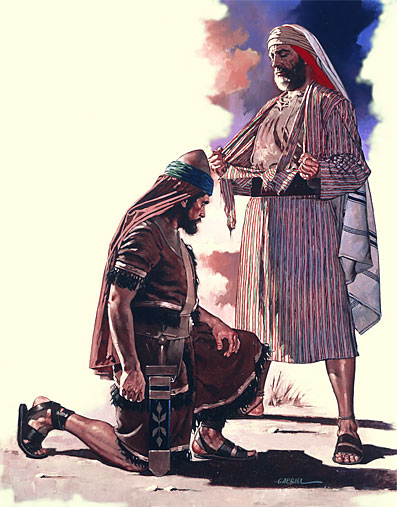Aug
7
2009
or Having No Controversies With God

The devil hates confession. It breaks his power over us. He would rather have us confine ourselves behind the bars of our own private Sheols than get right with God.
Why is confession so powerful? Because it is judicial. It is an application of the knowledge of good and evil. Continue reading
6 comments | tags: Bathsheba, David, Feasts, James Jordan, Nathan, Peter Leithart, Saul, Solomon, Systematic typology | posted in Biblical Theology, Christian Life, Quotes, Totus Christus
Jul
28
2009

How smart is this Book?
As discussed, if we begin with Saul’s anointing by Samuel, subsequent events follow the Feasts outline. Saul’s failure to kill Amalek is at Pentecost and his failure to defeat Goliath is at Atonement.
BUT… if we begin with David’s secret anointing by Samuel, subsequent events also follow the Feasts. This time, however, David’s slaying of Goliath is at Pentecost (the serpent/beast in the wilderness). Guess what’s at Atonement?
Continue reading
1 comment | tags: Amalek, Bible Matrix, Circumcision, David, Eglon, Ezekiel, Feasts, goliath, High Priest, Saul, Sidon, Systematic typology, Tabernacles, Tyre | posted in Biblical Theology
Jul
27
2009

Eli’s corrupt priesthood came to an end when the Ark was taken by the Philistines. Saul’s corrupt kingdom came to a full end when the Ark returned (hence Michal’s barrenness). The last of Eli’s priesthood (Abiathar) was exiled when Solomon’s government began. Solomon’s kingdom was a new firmament (1 Kings 10:19). Isaiah, however, saw it being rolled up like a scroll (Is. 34:4).
Continue reading
Comments Off | tags: Abiathar, AD70, Ark of the Covenant, Caiaphas, Cyrus, David, Eli, Feasts, High Priest, Literary Structure, Saul, Solomon, Systematic typology, Zechariah | posted in Biblical Theology, The Last Days
Jul
25
2009

or Worship-styles of the Bitter and Twisted
Under Rehoboam, Solomon’s kingdom became even more like Egypt. Solomon had imposed greater taxes upon his people than were appropriate, and his son Rehoboam took this to the extreme. So the Lord brought about a new Exodus, with Jeroboam as a kind of Moses. David felt guilty for cutting the corner off Saul’s robe — ie. grasping at Saul’s symbol of office — but to Jeroboam the prophet gave ten of the twelve pieces of his robe, the ten northern tribes.
Continue reading
Comments Off | tags: Aaron, David, Egypt, Golden, Jeroboam, Moses, Saul, Solomon | posted in Biblical Theology, Christian Life
Apr
15
2009
Ordinary People
In Judges and 1 Samuel, the weapons used to defeat the enemy reflect the ordinary people who used them: a tent peg, an ox goad, a millstone, an ass’s jawbone, a slingshot. It was Saul who started throwing spears like a Gentile, like Goliath.
Our weapons are not of this world, but many of them are still physical weapons: bread, wine, water, oil, bended knees, soundwaves, books, gifts, open ears, hospitality, open or closed church doors. These physical things capture people’s thoughts and make them obey Christ.
We live in this world, but we don’t act like its people or fight our battles with the weapons of this world. Instead, we use God’s power that can destroy fortresses. We destroy arguments and every bit of pride that keeps anyone from knowing God. We capture people’s thoughts and make them obey Christ. And when you completely obey him, we will punish anyone who refuses to obey.” 2 Cor 10:3-6 [CEV]
WEPOW
Comments Off | tags: goliath, Holy war, Judges, Saul | posted in Biblical Theology, Christian Life
Apr
10
2009
Saul and Agag
 I puzzled over Ezekiel chapters 38 and 39 for years. Bible commentators suggested many things but nothing seemed to fit the historical context of the surrounding chapters. It seems James B. Jordan was the first to put the pieces together.1
I puzzled over Ezekiel chapters 38 and 39 for years. Bible commentators suggested many things but nothing seemed to fit the historical context of the surrounding chapters. It seems James B. Jordan was the first to put the pieces together.1
Continue reading
Comments Off | tags: Amalek, Atonement, Babylon, Bible history, Esther, Ezekiel, Gary DeMar, Haman, James Jordan, Mordecai, Saul, Typology | posted in Against Hyperpreterism, Biblical Theology, The Last Days, Totus Christus
Apr
9
2009
And the LORD said, “Arise, anoint him, for this is he.” Then Samuel took the horn of oil and anointed him in the midst of his brothers. And the Spirit of the LORD rushed upon David from that day forward. And Samuel rose up and went to Ramah.
Now the Spirit of the LORD departed from Saul, and a harmful spirit from the LORD tormented him. And Saul’s servants said to him, “Behold now, a harmful spirit from God is tormenting you. Let our lord now command your servants who are before you to seek out a man who is skillful in playing the lyre, and when the harmful spirit from God is upon you, he will play it, and you will be well.” (1 Sam. 16:12-16)
Does God send evil spirits? …
Continue reading
Comments Off | tags: Babylon, Covenant curse, David, Herod, Jeff Meyers, Pharaoh, Satan, Saul, Temple | posted in Biblical Theology






























